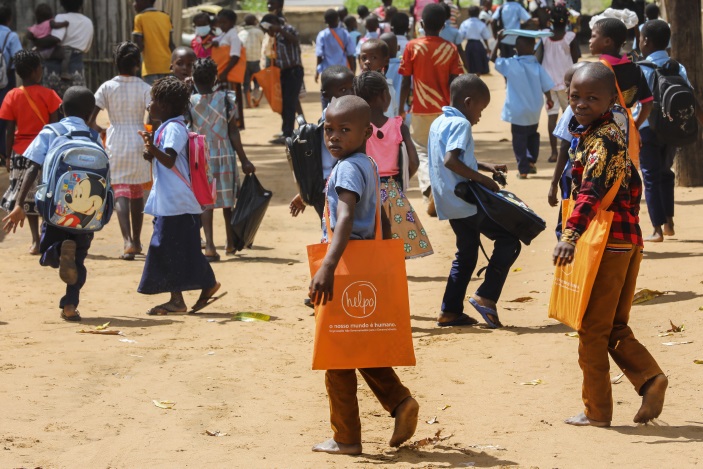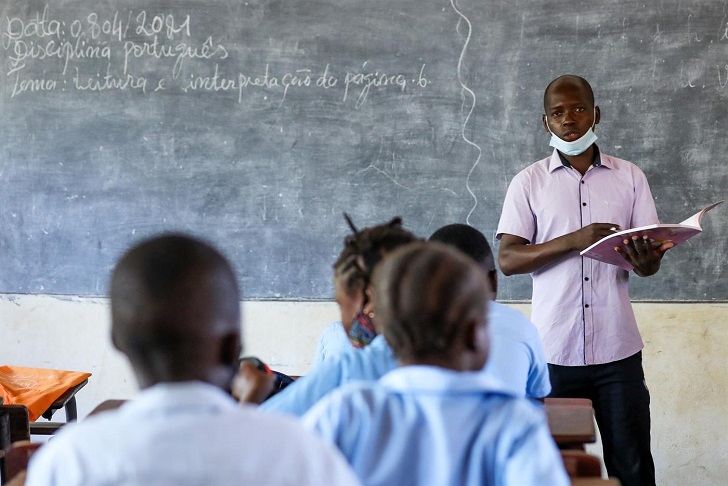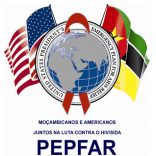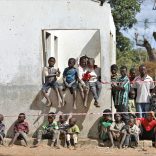Mozambique: Radiotherapy services resume after 15 months
Mozambique: Meet displaced teacher Mondelane João

All photos: Lusa
Violence made Mondelane João an IDP (displaced person) in Pemba. Now, the primary school teacher has found his family again, adapted to a different life and teaches children who, like him, were forced to flee their homes.
Mondelane João, 27, left the Muidumbe district of Cabo Delgado (northern Mozambique) in November last year, when the terrorists entered the region.
“I had a trip to Pemba. When I left my village in Muambula, I went to the crossing of Muatide, which comes from Namacande, which is the seat of the district, directly to the road that goes to [the district of] Mueda. When I arrived in Muatide, these armed groups were at the intersection. I never went back; I went straight to Mueda,” he relates.
He tells Lusa he was unaware of what had happened to his family until the end of November. They were separated in the village, some in the vegetable gardens, some doing other things, when the terrorists entered Muidumbe.
When he arrived in Pemba he immediately started trying to contact his family members.
“I kept communicating until I managed to save my family,” he said.
With the family reunited, he faced another challenge – that of remaking their life. But “it is not easy”: hunger and cholera are ever-present problems.
Returning to Muambula is a dream, and not something in any short-term plans.
“We would like to return to our village, but there is no way. Most of the people who left would like to return,” he says.
João talked to Lusa during a break between classes at one of the primary schools in the Mahate neighbourhood in Pemba.
With eight classrooms between its three sheds, the school is attended by almost 2,000 students, of whom 500 are displaced children, identifiable by the orange bags and the face masks made of capulana material.
Mondelane João teaches 60 children, five of them displaced from his home district of Muidumbe, and from Mocímboa and Palma.
Being bilingual is essential for teaching children displaced by the violence in Cabo Delgado, since many students only speak the Makonde and Macua languages.
Language is not an obstacle, but the lack of space makes learning difficult, even more so in the middle of a pandemic.
“The classrooms are few, the teachers are many, the students are many. There are classrooms where two teachers enter at the same time, which cannot be, because we are in an epidemic. This was not the guidance. We are trying to avoid the disease ”, he explained.
By 10:30 am, most of the children were already at the door of their classrooms. In this school there is no bell to warn them, but it was not necessary. Only a group of about 14 students were under a tree, taking shelter from the sun while waiting for the teacher’s entrance.
Despite exceeding the capacity, a volunteer from the Karibu project, which helps with the school integration of displaced children, said that in the neighbourhood of Mahate an estimated 7,000 children who have fled one of the conflict zones do not have access to school yet.
Those who do [have access to school], do not always go beyond the primary, because the nearest secondary is six kilometers away.
The violence unleashed more than three years ago in the province of Cabo Delgado gained a new escalation about two weeks ago, when armed groups first attacked the town of Palma, which is about six kilometers from the multimillion-dollar natural gas projects.
The attacks caused dozens of deaths and forced the flight of thousands of residents of Palma, aggravating a humanitarian crisis that has affected about 700,000 people in the province since the beginning of the conflict, according to United Nations data.
The Islamic State terrorist movement claimed control of the village of Palma on the border with Tanzania on Monday, but the Mozambican Defense and Security Forces (FDS) have completely retaken control of the town, announced on Monday. the spokesman of the Teatro Operacional Norte, Chongo Vidigal, an information reiterated this Wednesday by the Mozambican President, Filipe Nyusi.
Several countries have offered Maputo military support in the ground to fight these insurgents, but, so far, there has not yet been an opening for that, although there are reports and testimonies that point to the existence of security companies and mercenaries in the area.















Leave a Reply
Be the First to Comment!
You must be logged in to post a comment.
You must be logged in to post a comment.